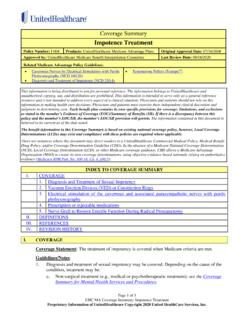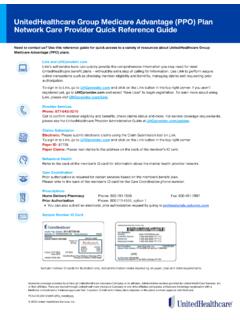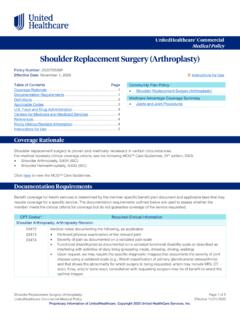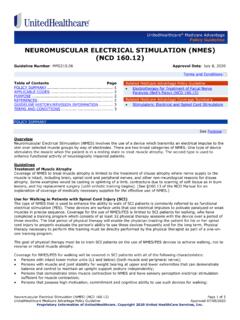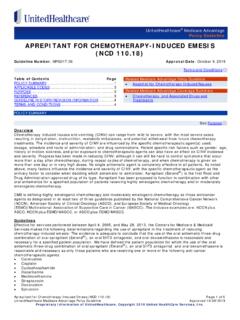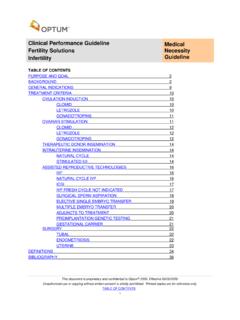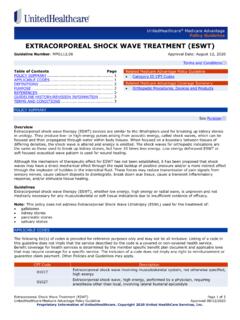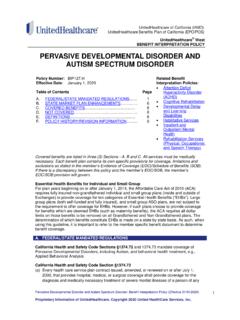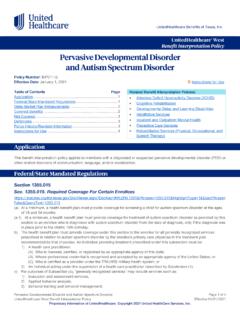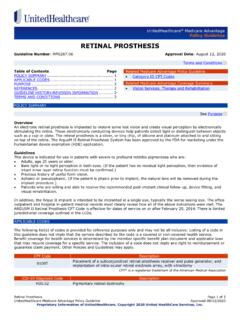Transcription of Hepatitis Screening – Commercial Medical Policy
1 Hepatitis Screening Page 1 of 9 UnitedHealthcare Commercial Medical Policy Effective 10/01/2021 Proprietary Information of UnitedHealthcare. Copyright 2021 United HealthCare Services, Inc. UnitedHealthcare Commercial Medica l Policy Hepatitis Screening Policy Number: 2021T0548X Effective Date: October 1, 2021 Instructions for Use Table of Contents Page Coverage Rationale .. 1 Definitions .. 2 Applicable Codes .. 3 Description of Services .. 3 Clinical Evidence .. 4 Food and Drug Administration .. 6 References .. 6 Policy History/Revision Information .. 7 Instructions for Use .. 8 Coverage Rationale Hepatitis C virus (HCV) Screening is proven and medically necessary in adults aged 18 to 79 years whether or not risk factors have been identified. Hepatitis B Screening is proven and medically necessary in individuals with the following indications.
2 Blood transfusion prior to 1992 Birth in or travel to regions with high or moderate prevalence of Hepatitis B virus (HBV) infection Elevated ALT/AST of unknown etiology Clotting-factor disorders, such as hemophilia Exposure to blood or body fluids Donors of blood, plasma, organs, tissue, or semen Following exposure to an individual with HBV infection through household, secondary contacts or needle sharing Hemodialysis High-risk sexual behavior HIV-positive infection, and those who are high risk of HIV acquisition Immunosuppression due to immunosuppressive therapy for rheumatologic or gastroenterologic disorders, chemotherapy, and organ transplantation Infants born in the whose parents were born in regions with high rates of Hepatitis B Infants born to HBV infected mothers Men who have sexual relations with men (MSM)
3 Pregnancy Present sexual partners of HCB-infected Prior to anti-TNF initiation Recipient of clotting factor concentrates made before 1987 Recipients of blood or organs from a donor who later tested HBV positive Residents and institutional care workers Current and past use of injection drug use. This includes those who injected once or a few times many years ago Hepatitis A Screening is proven and medically necessary for individuals who were born in, or have travelled to regions with Related Commercial Policy Preventive Care Services Community Plan Policy Hepatitis Screening Medicare Advantage Coverage Summary Preventive Health Services and Procedures Hepatitis Screening Page 2 of 9 UnitedHealthcare Commercial Medical Policy Effective 10/01/2021 Proprietary Information of UnitedHealthcare.
4 Copyright 2021 United HealthCare Services, Inc. high or moderate prevalence of Hepatitis A virus (HAV). Note: For additional information, refer to the Policy titled Preventive Care Services. Definitions HCV Antibody Test: The third-generation HCV EIA test is the most frequently used antibody test to initially screen for HCV infection. This test has high sensitivity, wide availability, and low cost. However, antibody is not detected for many months after infection. Hepatitis A: A highly contagious viral condition that causes inflammation affecting the liver's ability to function. Hepatitis A virus (HAV) infection is primarily transmitted by the fecal-oral route, by either person-to-person contact or consumption of contaminated food or water. Although viremia occurs early in infection and can persist for several weeks after onset of symptoms, bloodborne transmission of HAV is uncommon.
5 HAV, has an incubation period of approximately 28 days (range: 15 50 days). HAV replicates in the liver and is shed in high concentrations in feces from 2 weeks before to 1 week after the onset of clinical illness. HAV infection produces a self-limited disease that does not result in chronic infection or chronic liver disease. Hepatitis A Antibody Test: Also known as HAV IgM antibody, is the preferred test for diagnosis of acute Hepatitis A infection because it rises early and persists only 3 to 12 months. Hepatitis B: Hepatitis B virus (HBV) is transmitted through exposure to infective blood, semen, and other body fluids. HBV can be transmitted from infected mothers to infants at the time of birth or from family member to infant in early childhood. Transmission may also occur through transfusions of HBV-contaminated blood and blood products, contaminated injections during Medical procedures, and through injection drug use.
6 HBV also poses a risk to healthcare workers who sustain accidental needle stick injuries while caring for infected-HBV patients. Among persons with chronic HBV infection, the risk for premature death from cirrhosis or hepatocellular carcinoma is 15% to 25%. Hepatitis B Core Antibody Test: Also known as HBV Core IgM Antibody (HBcAb, IgM), is detectable during acute but not chronic HBV infection. Hepatitis B Surface Antigen Test: Also known as HBV Surface Antigen (HBsAg). Hepatitis B antigen is a protein on the surface of Hepatitis B virus; it can be detected in high levels in serum during acute or chronic Hepatitis B virus infection. The presence of HBsAg indicates that the person is infectious. The body normally produces antibodies to HBsAg as part of the normal immune response to infection. HBsAg is the antigen used to make Hepatitis B vaccine.
7 Hepatitis C: Hepatitis C virus (HCV) is mostly transmitted through direct percutaneous exposure to blood. This may happen through transfusions of HCV-contaminated blood and blood products, contaminated injections during Medical procedures, and through injection drug use. Sexual transmission is also possible but is much less common. According to the Center for Disease Prevention and Control and Prevention (CDC) Hepatitis C Guideline, Hepatitis C virus (HCV), is the most common chronic bloodborne pathogen in the United States; approximately million persons are chronically infected. Hepatitis D: Hepatitis D (HDV), also known as "delta Hepatitis ," is a serious liver disease caused by infection with the Hepatitis D virus. This is an RNA virus structurally unrelated to the Hepatitis A, B, or C viruses.
8 Hepatitis D, which can be acute or chronic, is uncommon in the United States. HDV is an incomplete virus that requires the helper function of HBV to replicate and only occurs among people who are infected with the Hepatitis B virus (HBV). The dual infection of HDV and HBV can result in a more serious disease and worse outcome. Hepatitis E: Hepatitis E virus (HEV) is mostly transmitted through consumption of contaminated water or food. HEV is a common cause of Hepatitis outbreaks in developing parts of the world and is increasingly recognized as an important cause of disease in developed countries. HEV infection usually results in a self-limited, acute illness. When HEV infection does occur, it is usually the result of travel to a developing country where Hepatitis E is endemic. (CDC Division of Viral Hepatitis , 2018; Quest Diagnostics, 2017) Hepatitis Screening Page 3 of 9 UnitedHealthcare Commercial Medical Policy Effective 10/01/2021 Proprietary Information of UnitedHealthcare.
9 Copyright 2021 United HealthCare Services, Inc. Applicable Codes The following list(s) of procedure and/or diagnosis codes is provided for reference purposes only and may not be all inclusive. Listing of a code in this Policy does not imply that the service described by the code is a covered or non-covered health service. Benefit coverage for health services is determined by the member specific benefit plan document and applicable laws that may require coverage for a specific service. The inclusion of a code does not imply any right to reimbursement or guarantee claim payment. Other Policies and Coverage Determination Guidelines may apply. CPT Code Description 86704 Hepatitis B core antibody (HBcAb); total 86705 Hepatitis B core antibody (HBcAb); IgM antibody 86706 Hepatitis B surface antibody (HBsAb) 86707 Hepatitis Be antibody (HBeAb) 86708 Hepatitis A antibody (HAAb) 86709 Hepatitis A antibody (HAAb), IgM antibody 86803 Hepatitis C antibody 86804 Hepatitis C antibody; confirmatory test ( , immunoblot) 87340 Infectious agent antigen detection by immunoassay technique, ( , enzyme immunoassay [EIA], enzyme-linked immunosorbent assay [ELISA], fluorescence immunoassay [FIA], immunochemiluminometric assay [IMCA]) qualitative or semiquantitative.
10 Hepatitis B surface antigen (HBsAg) 87341 Infectious agent antigen detection by immunoassay technique, ( , enzyme immunoassay [EIA], enzyme-linked immunosorbent assay [ELISA], fluorescence immunoassay [FIA], immunochemiluminometric assay [IMCA]) qualitative or semiquantitative; Hepatitis B surface antigen (HBsAg) neutralization 87350 Infectious agent antigen detection by immunoassay technique, ( , enzyme immunoassay [EIA], enzyme-linked immunosorbent assay [ELISA], fluorescence immunoassay [FIA], immunochemiluminometric assay [IMCA]) qualitative or semiquantitative; Hepatitis B antigen (HBeAg) 87902 Infectious agent genotype analysis by nucleic acid (DNA or RNA); Hepatitis C virus 87912 Infectious agent genotype analysis by nucleic acid (DNA or RNA); Hepatitis B virus CPT is a registered trademark of the American Medical Association HCPCS Code Description G0472 Hepatitis C antibody Screening for individual at high risk and other covered indication(s) G0499 Hepatitis B Screening in non-pregnant, high-risk individual includes Hepatitis B surface antigen (HBSAG), antibodies to HBSAG (anti-HBS) and antibodies to Hepatitis B core antigen (anti-HBC), and is followed by a neutralizing confirmatory test, when performed, only for an initially reactive HBSAG result Diagnosis Codes Hepatitis Screening : Diagnosis Code List Description of Services The word " Hepatitis " means inflammation of the liver.
